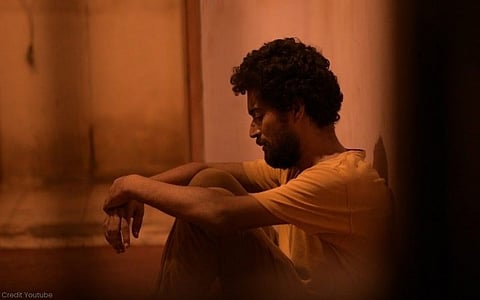
- Reviews
- Power List 2024
- Cannes 2024
- In-Depth Stories
- Web Stories
- News
- FC Lists
- Interviews
- Features
- FC SpecialsFC Specials

Director: Sanal Kumar Sasidharan
Cast: Rajshri Deshpande, Suni R S, Murali Gopi (voiceover)
In Sanal Kumar Sasidharan's Unmadiyude Maranam (Death of Insane), dreams aren't just the things you experience at night and remember vaguely (or sometimes, vividly) in the morning. The dreams in this film are dangerous. They represent man's capacity to create art ("I dream about making a movie"), or to question the status quo ("I dream of an equal society"), or the desire to just be ("I dream of holding hands with my beloved and perhaps giving her a kiss in public"), or even the capacity to inspire someone else to dream along these lines. But most people in the world do not wish to create art. Most people are happy with the status quo. Most people desire that everyone else be like them and no different. And so, most people will push back against dreamers. As someone says: "In a civilised society, how much should someone be allowed to dream? After all, there is no mention of dreaming in the constitution…"
This "someone" is a voiceover (Murali Gopy). You hear him throughout this experimental black comedy/satire, which Sanal made between S Durga and Chola. This voiceover, this "someone", provides a loose narrative framework on which the director (who's also the editor and screenwriter) can mount his disappointment and sadness and rage. And the events depicted in the film — through TV footage or recreated visuals — are those that evoke disappointment and sadness and rage: the kiss of love protest in Kozhikode, the agitation over the S Durga screening at IFFI Goa, the Gauri Lankesh murder, Sanjay Leela Bhansali being manhandled during the Padmaavat shoot, Sunny Leone's visit to Kochi… Wait, what? You may wonder, as I did, about the latter event. But I suppose she is, at the end, someone who sells dreams to the dreamers thronging the streets for a glimpse of her!
And in the world of this film — a fictional fantasy world right out of Kafka, but also chillingly reminiscent of modern-day India — those who sell dreams are deemed a menace to society. You dream of making art your own way? You dream of a neighbourhood where your sex life is nobody else's business? You dream of bringing down authoritarianism? Then, you need to be dealt with, because your dreams are a "disease" and they could be contagious. They could "infect" others, causing them to dream their own dreams. At one point, the police summon a father and son, and ask the lad, "Tell us what you dream about." They need to know. Our protagonist, Unmadi (the insane), isn't spared, either. He is first seen naked on a mountaintop, like Howard Roark at the beginning of The Fountainhead, perhaps the definitive story about a dreamer who is regarded dangerous to the functioning of society.
I suppose a "practical" society would call Roark a madman. He'd be another Unmadi, who's even banned from dreaming. His skin is red. Is that the colour of Sanal's rage, after what happened with S Durga? But even if this is an angry film, it's a dispassionate one. It makes you laugh at the absurdity we find ourselves in, like in the stretch where cinema halls are advised to display a disclaimer: Dreams are injurious to health. Inevitably, an underground rebellion ensues, with people downloading dreams into pen drives and selling them in the black market, like a drug. One of these rebels is captured, stripped, and beaten black and blue.
Sanal being Sanal, we see all this to an extent that we flinch: the capturing, the stripping, the black-and-blue beating. But as I said in my review of Chola, Sanal's cinema "has never been about the message itself, which has always been pretty unsubtle, pretty rudimentary. It's about the chilling delivery of this message. He constructs vivid, primal scenarios of the strong preying on the weak, and tosses us right in. We aren't just aware of what is happening. We experience it." Like S Durga, like Chola, like Ozhivudivasathe Kali, this is very much a story of oppression.
In one stretch, a naked couple is paraded around, as hooting "moral policemen" surround them and take selfies and an unnamed woman (Rajshri Deshpande, in a fleeting appearance) screams from behind the grills of a window. Dream-hunting has become a national sport, we are told. We become the first nation to ban dreams completely. What will now happen to the man we saw earlier, who was running around with a horse in an idyllic valley, after which the camera gazed at the sky and found a horse-shaped cloud? Or will the new reality be what it is in the Telangana town, where the national anthem is played on loudspeakers every day, at a particular time, and people stop in their tracks in respect (or due to fear), like statues?
I must say I prefer Sanal in a more "narrative" mode, like he was in S Durga and Chola. Unmadiyude Maranam is a little too loose and repetitive. But I suspect that, over time, this film, too, will come to be counted as an important work. It takes us all the way back (or all the way forward?) to cave paintings, the earliest representation of stories, dreams that we know nothing about today. It makes it difficult to tell truth from fiction, which is something we now take for granted in the world around us. Hence this mischievous (sarcastic, in other words) disclaimer at the opening: "All characters and events are fictitious. Any resemblance to real life is solely because of the fictions they are involved in. Beware of the fiction in your vicinity." Unmadiyude Maranam is that strange beast, a film about dreams that wants to prod you awake.